'It’s tradition': The child brides of Indonesia's Sumenep Regency
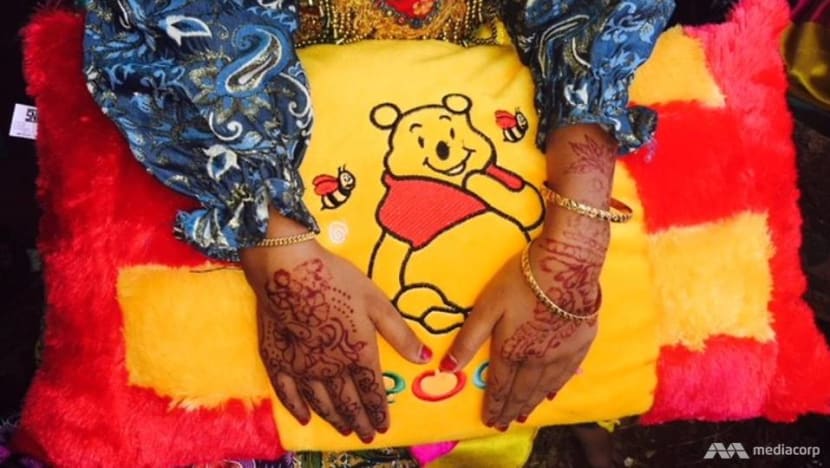
Intricate dye like 'henna' decorate the hands of the child brides. (Photo: Chandni Vatvani)
SUMENEP REGENCY, Indonesia: Bold makeup in hues of red and black lined their eyes, hair adorned with buds of jasmine, a bejewelled golden plate rested upon their foreheads, while more gold complemented vibrant clothing cinched at their waists.
Their small hands were intricately lined with a type of dye resembling henna; and while they looked like miniature human dolls, their faces were glum.
Shifty-eyed, fidgety and trying to keep their nervousness in check, these are the child brides and grooms of Sumenep Regency at their wedding.

Getting to Sumenep is no easy feat. The regency is 170km away from Surabaya, Indonesia’s second-largest city, on the island of Madura.
You’ll have to fly from Jakarta to Surabaya, which could take anywhere between 75 and 90 minutes and then embark on a four-hour drive; this is how we found ourselves driving into the regency one morning, passing dozens of salt farms along the way.
A RECEPTION TO REMEMBER
The children, six of them, were at their wedding reception being held at a field with a large tent in the district of Dungkek.
According to guests, the children had just married that morning – the oldest was a fourteen-year-old boy who married a 13-year-old; the youngest, a four-year-old child, was wed to a five-year-old boy, and the last couple were a pair of six-year-olds.
Parents of the brides and grooms took turns between standing at the entrance of the tent to welcome guests and accompany their children, who sat quietly on the sidelines of a feast held in their honour.
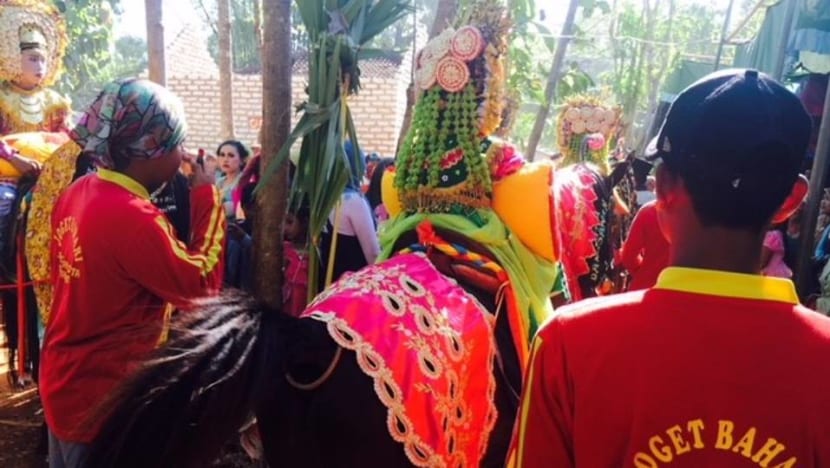
Alimatus Sadya, a mother of one of the brides explained that child marriage is commonplace in Madura.
“If anyone asks for the hand of your first child in marriage, you have to agree,” she said.
Her daughter, the oldest bride at thirteen years old, lurched forward and retched as she struggled to keep her emotions at bay. She was quickly pacified by Ms Alimatus and others around her.
The space under the tent was divided into two sections, one for men and the other for women.
Plush velvet sofas with golden frames sat atop a stage on one end. This is where guests were taking photos with the newlyweds prior to the feast.

A band positioned at the centre of the tent played traditional music and female dancers were putting on a show for the men, dancing closely with them while being showered with rupiah bills.
A group of men and women in each section were also huddled together as they made a note of every gift that the families of the children received, both of monetary and non-monetary value.
Another parent, Fitri, who goes by one name as many Indonesians do, explained that the children had been matched by their parents – her son and daughter had both been married off.
“Well, over here it’s like that, they’re married off at a young age; it’s tradition,” she said with a laugh. “I am so happy.”
EMBEDDED IN TRADITION
In 2016, the National Statistics Agency supported by UNICEF launched two reports on child marriage.
The report showed that the rate of child marriage in Indonesia remains high, with over one in four girls marrying before reaching adulthood.
Based on data from 2008 to 2015, the percentage of "ever-married" women aged 20 to 24 who married before the age of 18 across 33 provinces in Indonesia ranked by average prevalence, placed West Sulawesi in the top spot, while East Java ranked 14th.
Research done in June this year by an NGO, the Rumah Kita Bersama Foundation, showed that close to 70 per cent of the people in Madura’s Sumenep regency married before the age of 18.
The district of Dungkek had the highest number of child marriages in the regency, with about 80 per cent of its nearly 4,000 people - as per national population records in 2015 - having married as children.
Executive director for the foundation, Lies Marcoes Natsir, said that in Sumenep, it is usually because parents want a debt repaid.
“The people have a tradition, usually if they throw a party, they receive a lot of support from their neighbours – and this is a reciprocal occurrence, actually,” she explained.

“So, they can throw a party because other people owe them a debt. Now, this has been in practice for a very long time, their ancestors did this and they always make a note," said Lies.
"So if one family has a child, and they feel they want to collect what is owed to them from their neighbours – to whom they have already provided some sort of support – 'tumpangan' is what they call it – they will organise the marriage of their child, even if the child is still little.”
According to Lies, one of Indonesia's foremost experts in Islam and gender as well as a women’s rights activist, the goal is to collect a debt.
So, in the event of a drought for example, or in times of financial difficulty, families tend to get their children betrothed and organise a party.
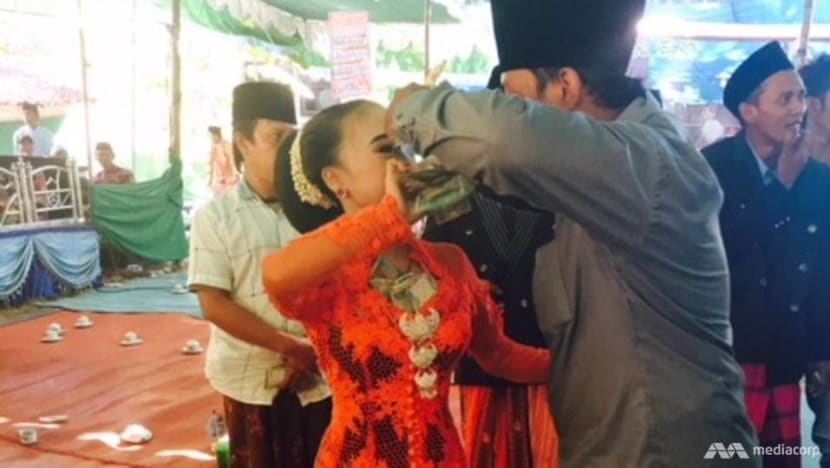
In the case of younger children, the marriage is known as a "hanging betrothal".
This arrangement means that while their marriage has been solemnised, they are "promised" to each other.
The children will only live together as husband and wife when they are deemed to be old enough by their parents to do so, which could be when they are as young as 14 years old.
Until then, the children live separately and continue their education, only for the "husband" to visit his "wife" during holidays and religious celebrations.
A SECRET AFFAIR
Fifteen-year-old Uus (not her real name) married her boyfriend last year when she was just 14. He was 19 at the time and he had asked her parents for her hand in marriage. The two had known each other for a year.
“We were only married by a religious teacher … compared to just being boyfriend and girlfriend, such an unclear status, it’s better to have something that is certain," she said, a reason which resonated with several of the child brides Channel NewsAsia spoke to.

Muslim marriages in Indonesia must be registered at the government’s Religious Affairs Office (KUA), something Uus and her husband have not done. This means that the two do not have a marriage certificate.
“We haven’t gone to the religious office; I’m not legal yet,” said Uus.
What the young couple have done is known as "nikah siri", which translates to mean unregistered or secret marriages - this is highly prevalent in Sumenep.
Indonesia’s 2002 Law on Child Protection prohibits marriage under the age of 18 under any circumstances, and such a marriage cannot be registered at the Religious Affairs Office.
But the country’s marriage laws are murky. Under the 1974 Marriage Law, which sets the legal parameters for marriage in the country, parental consent is required for all marriages under the age of 21.
With parental consent, girls can legally marry at the minimum age of 16 and boys at 19, providing they obtain approval from the religious court.
Parents can also file a petition at the religious court or district court to apply for an exemption and get their daughter to marry even earlier, with no minimum age limit, pending an approval.
“Well, if possible, we approve their request if the bride is 16 years old, because they are already mentally mature, so I think it’s okay," Risana Yulinda, head of the religious court in Sumenep Regency told Channel NewsAsia.
"But sometimes in the event that the child is two months, three months shy of turning 16, we’ll also approve the request because it’s just a little bit of time,”
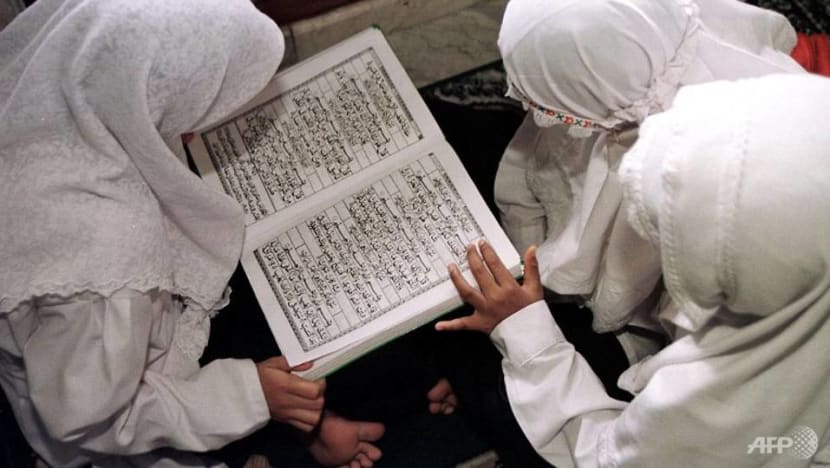
Applications to marry off children below the age of 16 years were assessed on a case-by-case basis, she said.
“Are they Muslims? Are there any obstacles to the relationship such as them being siblings? Is there a proposal from someone else? If they marry, is their husband ready to provide for them? Are they pregnant? These are all factors that we consider,” said Risana.
But anecdotal evidence suggests that many parents skip getting an approval from the court.
Instead, couples apply for a retroactive confirmation of the marriage when they reach an age deemed legal by Indonesian law.
According to Risana, couples generally apply for a retroactive confirmation when they need to get their paperwork in order.
For example, if they need to make a passport, or if they need to make a birth certificate for their child, these situations require a marriage certificate.
There were more than 200 couples in 2016 who applied for confirmation, she said. With no way for authorities to prove that they were children when the marriage took place, such loopholes only make underage marriages all the more difficult to tackle.
While tradition is a main factor for the practice, according to observers, religion plays a key role in its support.
“Religion has made it legitimate for members of the community to say that getting a child married is the right of the guardian, and when they get a child married, they base that right on the fact that the Prophet married Siti Aisyah when she was nine years old,” said Tatik Hidayati, a lecturer at the Anuqqayah Institute of Islamic Sciences.
“So they use that as a justification that Islam doesn’t forbid it."
These factors only add to the age debate.
AN UPHILL BATTLE
Records from the National Statistics Agency shows that there were 554 couples who divorced in 2016. There were also 55 cases of underage marriage sentenced by the Religious Court of Sumenep in the same year.

While there is no official data on whether the two overlap, or how many of the divorced couples married as children, authorities say the high divorce rate can be attributed to child marriage, and that they are working to tackle the issue through community engagement, by implementing various programmes.
“In fact in our planning programme, the most ideal age for women (to marry and bear children) is 21 years old, for men it is 25, which is the most ideal. According to their mental state, they are ready,” said Herman Poernomo, Head of Sumenep’s Empowerment of Women, Child Protection & Family Planning Office.
“If you marry your child off and he or she isn’t happy or prosperous, then what’s the point?” asked Herman, with the question he said he generally posed to parents wanting to marry off their children.
But many parents in Sumenep feel bound to the practice out of fear of their girls becoming so-called "spinsters", a status attached to societal stigma.
Sumarni was married at the age of 13. While she has a daughter of her own now, she said her parents were worried that she would always remain single, which is why they arranged for her marriage.
“The first night (together) I didn’t know anything, I only knew how to cry.”
According to Sumarni, once a child is married, they become their husband’s responsibility, and this also motivates many parents to marry their children off.
There is also a general sense of concern among parents in the regency of their children spending time in close physical proximity with members of the opposite sex, sparking fears among parents who worry that it “could lead to something.”
Authorities have said that they cannot force parents who are accustomed to these traditions forego the practice, but what they have been trying to do is familiarise them with the consequences in an effort to approach the issue with sensitivity.
Marrying as children is detrimental from a health perspective as well, parents are told.
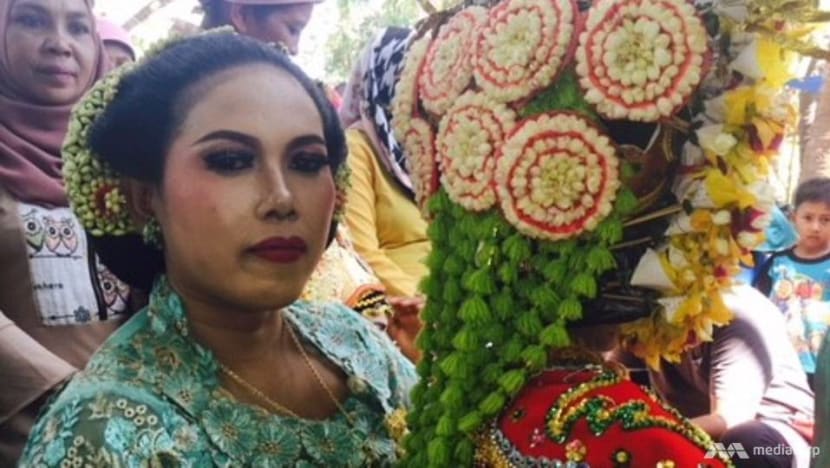
“A child who marries below the age of 15 and then gives birth, from a physical point of view it is not her time to give birth yet, so a woman’s reproductive organs are not ready for pregnancy,” said Hajah Kusmawati, head of health promotion at the regency’s health office.
She also cited the list of possible health conditions a pregnant child might go through in the course of giving birth, the extremity of which, is death.
“Abortion or the aborting of a baby because the child isn’t ready (to become a parent), internal bleeding, having a baby born underweight, then there’s also asphyxia, and a long labour.
“On the psychological front, the child is still a teenager, she will still wants to ‘have fun playing’; automatically, she won’t be optimal in taking care of a child she gave birth to,” Hajah said, adding that the parents or grandparents will take care of the child in such cases.
Data cited by the regency’s health office said that of about 69,200 teenagers in Sumenep, nine were pregnant in 2016, lower than the office’s 15-person estimate for the year.
According to Hajah, while children in the regency still got married, nowadays, they were likely to wait to before having children, at least until they turned 18 years old.
The health office, just like Sumenep’s Empowerment of Women, Child Protection & Family Planning Office, also engages the community with their programmes, which propagate healthy marriages at the age of 21 for girls, and 25 for boys.
In addition to their familiarisation programmes, the department provides counselling for children and parents as well, including having a dialogue with those who attempt to legitimise the practice by bringing religion into the matter.
Despite these programmes, the regency’s authorities emphasised that the country’s conflicting marital laws are an obstacle in their efforts. According to them, the onus is on the central government to revise the rules.
MOUNTING PRESSURE
Religious teachers have always played a key role in advising members of the community on traditional practices.
“Some traditions need to be upheld while others, child marriage among them, don’t,” stressed K Safraji, head of the Majelis Ulama Indonesia (MUI) in Sumenep regency, or the Indonesian Ulema Council, Indonesia’s highest clerical body.
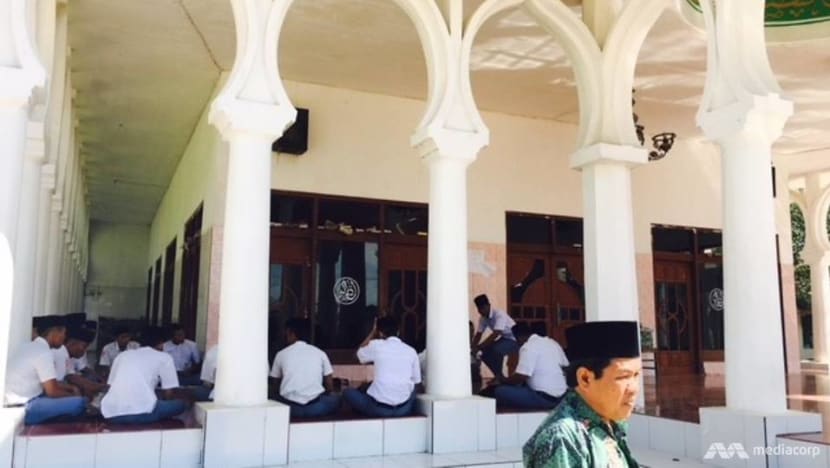
In 2015, Indonesia's Constitutional Court rejected an application to raise the marriageable age for girls from 16 to 18 years, on the grounds that raising the marriageable age would not guarantee a reduction in divorce rates nor would it solve health and social problems.
But, in a landmark moment, female clerics this year urged the government to do just that. They issued an unprecedented fatwa or edict against child marriage after a three-day congress held in Cirebon, West Java province.
While an edict is non-binding, it is influential – and serves as a guideline for Muslims to practice their faith according to the local context.
Earlier this year, the government also said that it would seek the help of male clerics, who deliver Friday prayer sermons in mosques to campaign against the practice of child marriage.
In Sumenep, these movements have begun but haven’t made much progress yet, with majority of the clerics in there unaware of the efforts.
“So far, no one from the government has come to familiarise us with these efforts yet to prevent child marriage,” said Lestariyadi, a cleric and head of the Nahdlatul Ulama, Indonesia’s biggest Muslim organisation, for Sumenep’s Batang-Batang district.
He added that he was optimistic about a positive change, at least for Sumenep’s children, if authorities spread word about the programme and got everyone on board to carry it out.
Indonesian Ulema Council Head, K Safraji said they had already begun engaging the community to spread awareness on the problem.

The Council also implemented a strict vetting process when families approached them to get their children married he said, being sure to ask questions about age, and whether the couple had gone to the Religious Affairs Office to register their marriage.
One problem he said which still occurs and which they are trying to tackle is the manipulation of data.
"Just sometimes, there is some manipulation done by the parents, where they will tell the Office that a child is say already 16 years old, when in reality, he or she is just 11," he said.
COMMITTING TO A SUSTAINABLE GOAL
Indonesia has committed to achieving its Sustainable Development Goals by 2030, its aims include eliminating all harmful practices against girls and women including child marriage.
But the Indonesian Coalition to End Child Marriage (18+ Coalition) in November issued a statement saying there had been no significant decrease in the number of child marriage rates in the past eight years.
The group cited data from the National Statistics Agency which showed child marriage rates were 27.4 per cent in 2008, and while they declined to 22.8 per cent in 2015, the rates went up to 25.7 per cent in 2017.
The group has accused the government of failing to commit to its goal.
“This indicates that the alleviation of child in marriage Indonesia has suffered a setback,” the group said in its press release.
Indonesia is ranked 37 on the global child marriage index and is the second highest in Southeast Asia after Cambodia.
With statistics like these, Lies Marcoes Natsir of the Rumah Kita Bersama Foundation said the situation concerning child marriage had reached a "critical" phase - at "emergency" level.
But while the problem is multi-layered, Lies is optimistic that the issue can make headway on certain conditions which should be addressed ahead of others.
“There are two conditions that I believe should be addressed immediately. The first one, is the state’s willingness to explore the possibility of reproduction and sexual education,” she said.
Pregnancy is also one of the reasons children are forced to marry she explained.
“We conducted research in 2014-2015 in nine regencies across five provinces, and we found that out of 52 children who were married, 36 among them got married because they were pregnant, pregnant and underage.”
In this context, the Religious Affairs Office (KUA) and the Religious Court fall under pressure from parents.
According to Lies, if the Religious Affairs Office declines to approve their marriage, parents would then go to the village branch and marry off their children without officially registering them, or, they would manipulate data such as the date of births and make the marriage happen.
The second issue according to Lies has to do with mindset.
"I believe is that if the child is already pregnant, what should be done – the child has two choices – either abortion or to bring the pregnancy to full term without having to marry."
Lies went on to explain that the government must be brave enough to be able to tell people not to punish the baby or the mother, whether for being illegitimate or having so-called "bad morals".
“If the government or all of us can be open and honest about these facts, then there is hope," she said.
"But if this is not carried out, even if there is a national effort, or a coalition among the ministries, but they do not want to be open about sexuality, then it will be very difficult."












